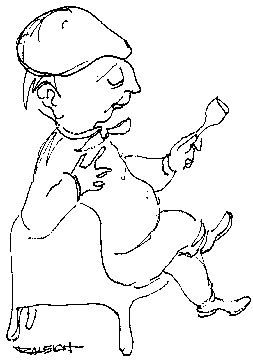 |
It’s All in the Pronunciation
By
HENRY P. RALEIGH
ART TIMES October 2007
I WAN’T INVITED to Cannes again this year. The nearest I’ve ever gotten to this resort town in France is my recent viewing of “Bienvenue Cannes”, the documentary celebrating sixty years of the most famous of the annual international film festivals. It was here that I tumbled onto something that may very well have been blocking my film career. Well, at least substantially slowing it down. You see, for the first years of my introduction to film — I was, you know, an early member of MOMA’s Cinema 16, and as Cannes had become the showcase for the best of work films, it was my wont to refer to that town in a manner that lent that troublesome letter ‘a’ in its name a good long (and, I imagined, a sophisticated French touch) ‘ah’ sound. The rest of the word, all after the ‘a’, I’d sort of swallow up in a nice, nasal mumble. Now I tossed the word around, willy-nilly, along with a handful of swell French terms like montage, mise en scène, and crème de menthe. I was particularly attracted to words that had a little thingy over the ‘e’ until I noticed that people in the film business were saying Cannes with a hard ‘a’, very much as it sounds in ‘Canada’ and every once in a while you might hear a decidedly hard ‘a’ as in ‘vain.
Well sir, if that’s the way Roger Ebert and Leonard Maltin pronounced the word, and I guess that they had actually attended the Festival so should know, all right, then I’d be pretty foolish sticking to my pretentious ‘ah’ wouldn’t I? It was my fault, after all; if I had checked my dictionary before I fell into the habit — oh, careless youth — I would have seen the ‘Canada’ comparison. Still, I didn’t care for the hint of tinnyness in this apparently preferred sounding of the town and I took to referring to Cannes in a roundabout way as “a place where the well-known film festival is held every Spring twenty miles South-West of Nice.” This was awkward but I was perfectly comfortable knowing that Nice was always and forever, ‘Neece’.
Things went on like this until I saw “Bienvenue Cannes” and was astonished to hear the participants unashamedly speaking the name Cannes with a melodious and soothing ‘ah’. So what’s going on here? Is there some protocol regarding the proper place and time to speak the word one way and not the other? I’m aware that arty, smarty-pants types are given to saying ‘Van Gock’, while we are satisfied that a simple ‘Van Go’ is good enough for any honest American. And I did once see Martha Stewart basting chicken legs with what she called a ‘mari-naaad’. So, if I use the ‘ah’ in, say, a town like New Paltz, New York, do I appear too show-offy and affected but right in the international and fashionable swing of things if casually spoken in Nice, France? And if mistakenly falling back to the harder ‘a’ in Cannes as I am sipping aperitifs in Nice will I be seen as a hopeless hick just off a turnip truck? You can understand, I’m sure, the dilemma I found myself in, for I certainly do want to be seen as worldly with even a bit of attractive weltschmerz thrown in.
Luckily though, I noticed that one of the personalities interviewed in “Bienvenue Cannes” was identified as a ‘cineast’. Cineast, cineast — I was immediately taken with this splendid French word. My old French/English dictionary defined a cineast as a film producer. However, my Webster lists but one, single meaning — a ‘devotee’ of film and generously provides a choice of spellings. That’s it, this was for me, a devotee of film and I may take the third spelling, the one with the thingy over the ‘e’. That thingy is an undeniable sign of worldliness, vacations in Dubai, mad love affair, and driving a Mercedes CL 600. But best of all, the cineast in the film spoke the name Cannes with an absolutely assured ‘ah’. I will too, and if anyone questions my pronunciation of Cannes I’ll just tell them I am a cinéast, pointing arrogantly to the thingy over the ‘e’. As a matter of fact, I will be certain to especially pronounce the thingy over the ‘e’ — if that’s at all possible.
